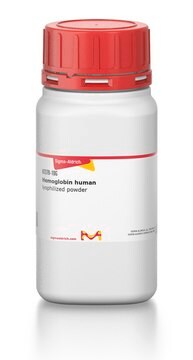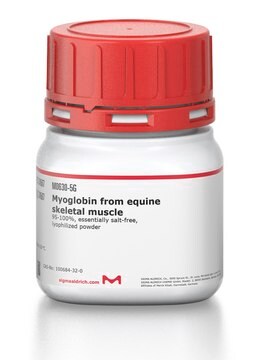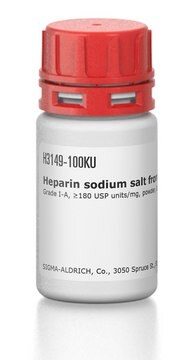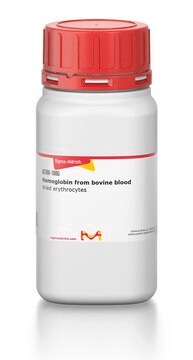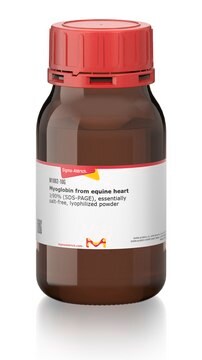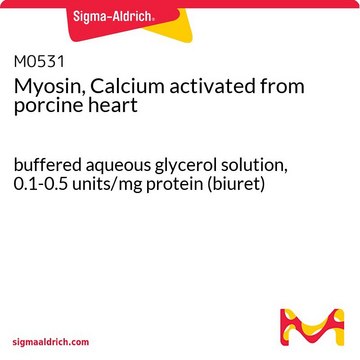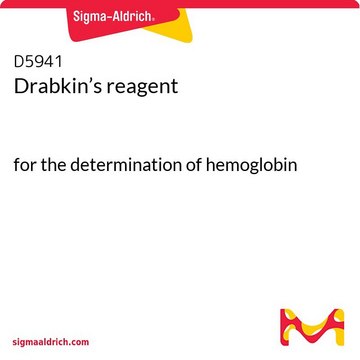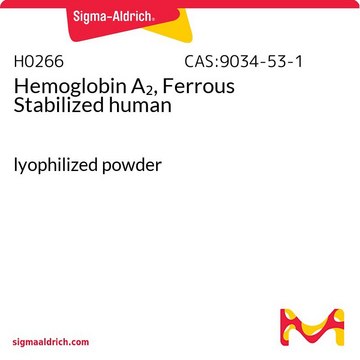H4632
Hemoglobin equine
lyophilized powder
Synonym(s):
Hb
Sign Into View Organizational & Contract Pricing
All Photos(1)
About This Item
Recommended Products
biological source
horse
Quality Level
form
lyophilized powder
technique(s)
protein quantification: suitable
solubility
H2O: soluble 10 mg/mL
storage temp.
2-8°C
Gene Information
horse ... HBA(100036557) , HBB(100054109)
General description
Hemoglobin is the major component of red blood cells and is responsible for their red color. Its normal concentration in erythrocytes is 34%. The structure of horse hemoglobin was elucidated first. It comprises heme (iron protoporphyrin IX group) and four polypeptide chains. The fetal and adult hemoglobin of horse are structurally identical.
Application
Hemoglobin equine has been used as a standard protein:
- to test solid-film sampling methodology in Fourier transform infrared spectroscopy (FT-IR) for protein secondary structure determination
- in capillary reversed-phase liquid chromatography-tandem mass spectrometry (LC/MS/MS) post enzymatic digestion
- for quantification of hemoglobin content from the planktonic crustacean, Daphnia magna
Biochem/physiol Actions
Hemoglobin is the most important respiratory protein of vertebrates by its ability to transport oxygen from the lungs to body tissues and to facilitate the return transport of carbon dioxide. The ferrous-ferric (Fe2+/Fe3+) balance is a physiological indicator of blood oxygenation. Deoxygenated hemoglobin accessorizes a feedback loop by reducing nitrite to nitric oxide (NO), a vasodilator which enhances blood flow to oxygen-deprived tissues. The fetal and adult hemoglobin from horse display differences in their affinity towards 2,3-diphosphoglycerate (2,3-DPG). Mutation in the globin gene is implicated in sickle cell anemia.
Oxygen transporter, NO scavenger
Caution
Since native hemoglobin is readily oxidized in air, these preparations may be predominantly methemoglobin.
Storage Class Code
11 - Combustible Solids
WGK
WGK 3
Flash Point(F)
Not applicable
Flash Point(C)
Not applicable
Personal Protective Equipment
dust mask type N95 (US), Eyeshields, Gloves
Choose from one of the most recent versions:
Already Own This Product?
Find documentation for the products that you have recently purchased in the Document Library.
Customers Also Viewed
Pavel V Bondarenko et al.
Analytical chemistry, 74(18), 4741-4749 (2002-09-28)
In this report, we describe an approach for identification and relative quantitation of individual proteins within mixtures using LC/MS/MS analysis of protein digests. First, the proteins are automatically identified by correlating the tandem mass spectra with peptide sequences from a
A comparative study on STM imaging and electrocatalytic activity of different surfaces modified with flavin adenine dinucleotide
Jingdong Zhang, Qijin Chi, Erkang Wang, Shaojun Dong
Electrochimica Acta, 40, 733-744 (1995)
Alan N Schechter
Blood, 112(10), 3927-3938 (2008-11-08)
Much of our understanding of human physiology, and of many aspects of pathology, has its antecedents in laboratory and clinical studies of hemoglobin. Over the last century, knowledge of the genetics, functions, and diseases of the hemoglobin proteins has been
Alain J Marengo-Rowe
Proceedings (Baylor University. Medical Center), 19(3), 239-245 (2007-01-26)
In 1949 Pauling and his associates showed that sickle cell hemoglobin (HbS) belonged to an abnormal molecular species. In 1958 Ingram, who used a two-dimensional system of electrophoresis and chromatography to break down the hemoglobin molecule into a mixture of
Yan Zhang et al.
Zoological science, 20(9), 1087-1093 (2003-10-28)
The physiological significance of the position and shape of the oxygen equilibrium curve (OEC) of horse hemoglobin (Hb) is considered from the viewpoint of oxygen (O2) transport efficiency and the effectiveness of the Bohr effect. In horse fetal and maternal
Our team of scientists has experience in all areas of research including Life Science, Material Science, Chemical Synthesis, Chromatography, Analytical and many others.
Contact Technical Service